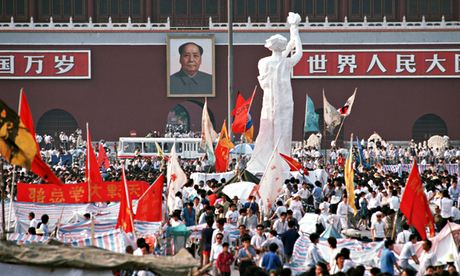If only the massacre were a bad nightmare!
 |
| source |
The thoughts expressed by some of those who protested then are moving. Powerful. Like this protester:
Hu Jia is one of China’s best-known political activists. He participated in the 1989 Tiananmen protests as a fifteen-year-old, studied economics, and then worked for environmental and public health non-governmental organizations. A practicing Buddhist, Hu spent three and a half years in prison between 2008 and 2011 for “inciting subversion of state power” and currently is under house arrest for having launched a commemoration of the June Fourth massacre in January.What does Hu have to say about today's China?
After being in power for sixty-five years, the worst thing the CCP has done is create a sense of spiritual confusion. We have no belief or faith. Instead we have brutal competition and treating people brutally. If someone falls, no one goes to help them. People have to consider if they’ll be accused by the old person of having caused the accident. This happens all the time, so no one goes to help people.About the protests, Shen Tong, a student leader then, and now living in the US, says:
That’s what China is like now.
If Chinese Communist history is any guide, no matter how careful we were, no matter how 'well-behaved', the crackdown was inevitable. If we'd asked for a little bit more. if we'd asked for regime change – China would have been very different. We had generals warning the government not to open fire.As another young protester then, and a Harvard lecurer now, Rowena He says:
When another opportunity comes about, will protests be so organised and peaceful? It is when; there's no if; there's a moral direction in history. The night before they began, the protests were impossible; the morning after, they were inevitable.
China has to face its past in order to have a future.No bad dream it was. Young people died. Mothers continue to mourn them:
Xu Jue’s son was shot dead by a soldier. Within a few weeks, her husband’s hair had turned white. Five years later he died. Qisile, she explained: angered to death. On her husband’s tombstone is a poem explaining what killed both men:
Let us offer a bouquet of fresh flowers
Eight calla lilies
Nine yellow chrysanthemums
Six white tulips
Four red rosesEight-nine-six-four: June 4, 1989.
2 comments:
Hu Jia's is spot on. There is a moral and spiritual vacuum in China. It is a good demonstration that when money is the only motive there is much lacking- a society that is purely mercantile is not a great society. China has lost its ancient culture, its traditions and its philosophies, etc. Now, there is a rising tendency certainly amongst the middle class of asking "after money, what ?"
An atheist might scoff at the spiritual confusion, but it is only a short journey from the moral to the spiritual. The sense of emptiness that Hu Jia is articulating is very real.
While I want to resist taking the focus away from Tiananmen, I have no choice but to respond to the the comment about "an atheist" ;)
Whatever you might have meant there, the reality is that there is an impression among the larger society that atheists belong to a single type of the CCP or the old USSR types. There is a world of a difference, perhaps even more than a difference between Hinduism and Islam, between what the CCP has achieved versus the kind of atheists that I and many others are.
To quote two others from my own blog:
First, Michael Shermer:
"the soft bigotry of those who cannot conceive of how someone can be in awe without believing in supernatural sources of wonder. ... Instead of fear and trembling, we feel wonder and gratitude in discovering that the author's hand is nature's laws and nothing more, but also nothing less."
Second, Steven Weinberg:
"Living without God isn’t easy. But its very difficulty offers one other consolation—that there is a certain honor, or perhaps just a grim satisfaction, in facing up to our condition without despair and without wishful thinking—with good humor, but without God"
More via this: http://sriramkhe.blogspot.com/search/label/atheists
One huge reason why we atheists differ from "the worst thing the CCP has done" is this: we read, think through and arrive at whatever conclusions we reach because we are able to do that freely. Free to think is what makes this possible. And, thus, we lead lives that are meaningful to us, unlike the Chinese sense of emptiness.
Post a Comment